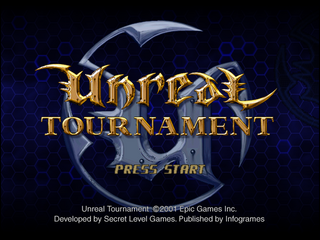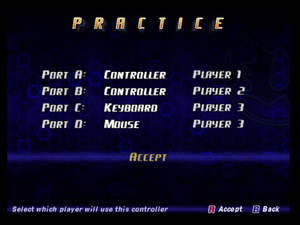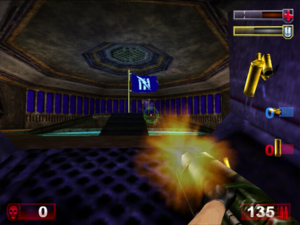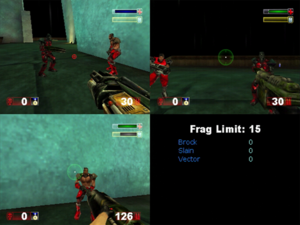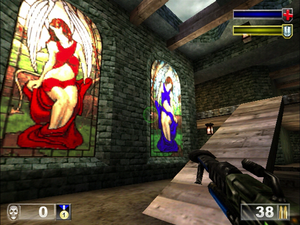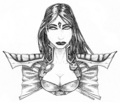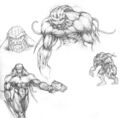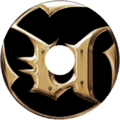Difference between revisions of "Unreal Tournament"
From Sega Retro
m (Text replacement - "\| developer=(.*) \| system" to "| developer=$1 | distributor={{company|Tec Toy|region=BR}} | system") |
|||
| (5 intermediate revisions by 2 users not shown) | |||
| Line 1: | Line 1: | ||
{{Bob | {{Bob | ||
| bobscreen=UnrealTournament title.png | | bobscreen=UnrealTournament title.png | ||
| − | | publisher={{company|[[Infogrames Inc.|Infogrames, Inc.]]|region=US}}, {{company|[[Infogrames]]|region=EU}} | + | | publisher={{company|[[Infogrames Inc.|Infogrames, Inc.]]|region=US}}, {{company|[[Infogrames Europe]]|region=EU}} |
| developer=[[Epic Games]], [[Secret Level Games]] | | developer=[[Epic Games]], [[Secret Level Games]] | ||
| distributor={{company|[[Tec Toy]]|region=BR}} | | distributor={{company|[[Tec Toy]]|region=BR}} | ||
| Line 572: | Line 572: | ||
| square=yes | | square=yes | ||
| disc=UnrealTournament DC EU Disc.jpg | | disc=UnrealTournament DC EU Disc.jpg | ||
| + | | manual=UnrealTournament-DC-FR-Manual.pdf | ||
}} | }} | ||
{{Scanbox | {{Scanbox | ||
| Line 596: | Line 597: | ||
| back=Unreal dc br backcover.jpg | | back=Unreal dc br backcover.jpg | ||
| square=yes | | square=yes | ||
| − | | disc= | + | | disc=UnrealT-DC-BR-Disc.jpg |
| inlay=UnrealTDCBRInlay.jpg | | inlay=UnrealTDCBRInlay.jpg | ||
| manual=UnrealTDCBRManual.pdf | | manual=UnrealTDCBRManual.pdf | ||
| Line 603: | Line 604: | ||
==Technical information== | ==Technical information== | ||
{{mainArticle|{{PAGENAME}}/Technical information}} | {{mainArticle|{{PAGENAME}}/Technical information}} | ||
| − | |||
| − | |||
| − | |||
| − | |||
| − | |||
| − | |||
| − | |||
| − | |||
| − | |||
| − | |||
| − | |||
| − | |||
| − | |||
| − | |||
| − | |||
| − | |||
| − | |||
| − | |||
| − | |||
| − | |||
| − | |||
| − | |||
| − | |||
| − | |||
| − | |||
==External links== | ==External links== | ||
Latest revision as of 10:22, 10 November 2024
Unreal Tournament is a first person multiplayer shooter developed by Epic Games as a spin-off of the Unreal series. Originally released for Windows PCs, it was ported to the Sega Dreamcast in 2000 by Secret Level.
Contents
Gameplay
Unreal Tournament is a multiplayer FPS, and thus games always feature two or more players navigating a map from a first person perspective. Similar to other Unreal games there are weapon and item pickups, however gameplay is centred around competing against other players, rather than in prior games where the goal was to get to a specific point on the map.
Game modes
The Dreamcast version of Unreal Tournament features four main modes of gameplay;
- Deathmatch - The player with the most frags wins.
- Team Deathmatch - Two teams compete to earn the most frags
- Domination - Two teams compete to take over marked areas by touching icons that earn points for the team overtime. The team with the most points wins.
- Capture the Flag - Two teams compete to capture the other team's flag and bring it back to their own flag.
These can be played either in single player (where the player competes against computer-controlled "bots") or local multiplayer. In North America online multiplayer was also an option until the servers were shut down in 2003 - this feature was removed from PAL versions[5].
Control options
Unreal Tournament for the Dreamcast is compatible with a number control options which can be configured by the user. Along with the standard controller, the MadCatz Panther DC as well as the Dreamcast Keyboard and Dreamcast Mouse are compatible with the game. As the mouse and keyboard configuration requires two controller ports, it is possible to map individual players to two devices in split-screen multiplayer. During three or four player matches, each player can only use one controller, keyboard or Panther DC. The game does not consider the mouse alone as a control choice.
During online matches, the Dreamcast keyboard can also be used for text chatting between players, or between team members during team games.
Characters
The Dreamcast version only features male avatars as playable characters and bots. Up to eight players/bots can play at once. All instances of other genders and races have been removed, and the Dreamcast has taken the class types down to Soldier only.
- Harlin
- Slain
- Malcom
- Wraith
- Vector
- Rankin
- Manwell
- Othello
- Radkin
- Tensor
- Johnson
- Kregore
- Riker
- Drake
- Matrix
- Brock
- Arkon
- Von
- Bruce
- Kosak
- Jared
- Necroth
- Cecil
- Otavio
- Diax
- Drimacus
- Whitman
- Raynor
- Boris
- Karag
- Zenith
- Graves
- Luthor
- Obrand
- Ramirez
- Barak
- Adams
- Bertka
- Grail
- Bretz
- Kakuschke
- Itchys
- Kern
- Jensen
- Clark
- Gordon
- Blake
- Gorn
- Aquino
- Pride
- Kragoth
Techniques
- Killing Sprees
- Multi Kills
- Double Kill
- Multi Kill
- Ultra Kill
- Monster Kill
- Headshots
- Dodging
Mutators
In Unreal Tournament, "mutators" are used to significantly adjust the game rules.
- InstaGib
- Low Grav
- Slomo
- Hyperspeed
- No Redeemer
- No Powerups
- Instant Rockets
- Pulse Arena
- Rocket Launcher Arena
- Shock Rifle Arena
- Jump Match
Items
Weapons
Most weapons in the game feature two different firing modes. Some firing modes may be disabled through the use of Mutators.
- Impact Hammer
- Enforcer
- Shock Rifle
- Ripper
- Rocket Launcher
- Flak Cannon
- BioRifle
- Sniper Rifle
- Minigun
- Pulse Gun
- Chainsaw
- Redeemer
- Translocator
Health
- Health Vial
- Health Pack
- Keg O' Health
Armor
- Thigh Pads
- Body Armor
- Shield Belt
Power-Ups
- Damage Amplifier
- Invisibility
- Anti Grav Boots
List of maps
A number of levels have been converted, edited or created exclusively for the Dreamcast version (As well as the Playstation 2 version,) to accommodate for the maximum player count of eight. Certain levels can only be played splitscreen depending on their size and system resources. SegaNet subscribers were given access to two exclusive maps if they subscribed to Sega's now defunct online service. Below is a list of levels and the maximum number of players allowed for each both online and offline splitscreen.
| Map | Max Players Online or Bots | Max Players Split-screen |
|---|---|---|
| Agony | 6 | 3 |
| Babylon | 4 | 3 |
| Barricade | 8 | 4 |
| Blockparty | 6 | 3 |
| Brickyard | 6 | 3 |
| Canyon Fear | 4 | 3 |
| Codex | 8 | 4 |
| ColdSteelPressure | 4 | 4 |
| Core | 4 | 3 |
| Curse | 8 | 3 |
| Damnation | 4 | 4 |
| Deck16 | 6 | 4 |
| Depot | 4 | 3 |
| Dust | 4 | 3 |
| Flux | 4 | 3 |
| Gearbox | 4 | 3 |
| Girder | 4 | 3 |
| 4 | 2 | |
| Halberd | 6 | 3 |
| Healpod | 6 | 4 |
| Hyperblast | 6 | 4 |
| Industrial | 6 | 4 |
| Infernal | 4 | 3 |
| Instinct | 4 | 3 |
| Liandri | 6 | 4 |
| Loathing | 4 | 4 |
| Malevolence | 8 | 3 |
| Megaplex (SegaNet Map) | 6 | 3 |
| Morbias | 4 | 2 |
| Morpheus | 6 | 3 |
| Nebula | 6 | 3 |
| NeoTokyo | 4 | 3 |
| Oblivion | 4 | 2 |
| Outskirts (SegaNet Map) | 6 | 1 |
| Paladin | 4 | 4 |
| Pantheon | 6 | 3 |
| Phobos | 2 | 2 |
| Pressure | 8 | 4 |
| Sector9 | 4 | 4 |
| Singularity | 6 | 4 |
| Sorayama | 6 | 4 |
| Spacenoxx | 4 | 4 |
| Stalwart | 6 | 3 |
| StalwartXL | 8 | 4 |
| StationControl | 4 | 4 |
| Underlord | 4 | 3 |
| Map | Max Players Online or Bots | Max Players Split-screen |
|---|---|---|
| Command | 8 | 4 |
| Coret | 8 | 4 |
| Dreary | 8 | 3 |
| EternalCave | 8 | 4 |
| Face | 6 | 4 |
| Face2 | 6 | 2 |
| Gauntlet | 8 | 2 |
| Lavagiant | 8 | 1 |
| Niven | 8 | 2 |
| Phalanax | 6 | 4 |
| Sepulchre | 6 | 4 |
| Spirito | 6 | 4 |
| Stormfront | 6 | 4 |
| Sundial | 6 | 4 |
| Map | Max Players Online or Bots | Max Players Split-screen |
|---|---|---|
| Cinder | 8 | 3 |
| Coagulate | 6 | 4 |
| Condemned | 6 | 3 |
| Gearbolt | 8 | 2 |
| Ghardhen | 8 | 4 |
| Hood | 4 | 4 |
| Lament | 6 | 4 |
| Olden | 8 | 2 |
| Osiris | 6 | 4 |
Versions
Much like the Dreamcast port of Quake III Arena, there are cosmetic differences between the PC and Dreamcast versions of the game in terms of features and censorship. On the Dreamcast, only a maximum of eight players can compete in offline practice matches, either with seven bot players or eight players online, or a maximum of four players on one console through split-screen multiplayer.
The Dreamcast version of Unreal Tournament is based on the PlayStation 2 version of the game, which was created in-house at Epic Games. The publisher, Infogrames, commissioned developer Secret Level to convert the title to Dreamcast.
The Dreamcast's 8 MB VRAM was sufficient for all of the game's polygons and textures, with the framebuffer and polygons using 3.5 MB, while the PowerVR CLX2's hardware texture compression was used to compress the textures into the remaining 5.5 MB of VRAM.[9] However, the Dreamcast version is missing some features, including instances of dynamic lighting, reflective surfaces, simpler water textures, and in some levels, a skybox. Several levels were downscaled in terms of geometry, effects, and size. Due to RAM limitations, certain levels become unavailable for split-screen multiplayer. Several features from the PC version are also missing, such as the "Assault" game type due to map sizes being too large, and the female, robot and Nali War Cow avatars are not selectable player types.
Texture filtering differs considerably between the Dreamcast and PlayStation 2 platforms (with the Dreamcast having more texture filtering), and the Dreamcast version runs with an uncapped 60 FPS frame rate (as opposed to a locked 30 FPS on PS2). The Dreamcast maintained a stable frame rate of around 40 FPS on most maps, while peaking at 60 FPS, but occasionally struggles with larger maps, sometimes dropping as low as 15 FPS when under strain. The Dreamcast version's frame rates are comparable to how the PC version ran on early 2000 PC hardware, which maintained an average frame rate of around 40 FPS with graphics cards like the Nvidia GeForce 256, GeForce 2 GTS and ATI Rage Fury Maxx.[10]
At the time, Unreal Engine was still being primarily developed for PC use, as console support did not become a major feature until Unreal Engine 2 (2002) and would not hit mainstream console development until Unreal Engine 3 (late 2005). It was thus not optimized for Dreamcast hardware. With 200-800 polygons per scene for the backgrounds and 300-400 polygons per character, the original PC version of Unreal Tournament peaked at 7100 polygons per scene (with 16 characters),[11] while the Dreamcast version peaked at 4000 polygons per scene (with 8 characters), a small fraction of what other Dreamcast games rendered while maintaining 60 FPS (e.g. up to 52,000 polygons per scene for the backgrounds and 9246 polygons per character in Dead or Alive 2). Dynamic lighting was also used to much greater effect in the Dreamcast version of Quake III Arena,[12] which rendered up to 10,000 polygons per scene.[13]
The game has also been lightly censored in order to comply with standards and practices established by Sega at the time. Certain textures featuring nudity have been redrawn, however the PlayStation 2 version lacks any form of online play, and still lacks the amount of content seen in the PC version.
SegaNet members were granted access to two exclusive levels, Megaplex and Outskirts, via a paying membership. Due to the discontinuation of the Dreamcast's network capabilities and SegaNet, the feature can no longer be obtained through normal means. To unlock them without a SegaNet acount, with the Dreamcast Modem plugged in, navigate to the Network screen, select Account2, and enter the following variables:
Login: [email protected]
Password: tenages
Area Code: (Enter any three numbers.) Then select Connect and save settings.
Leave the other variables to their defaults, then select "Connect" and save settings. The two levels should then be unlocked.
Magazine articles
- Main article: Unreal Tournament/Magazine articles.
Promotional material
Artwork
Loading screens
Physical scans
| Sega Retro Average | ||||||||||||||||||||||||||||||||||||||||||||||||||||||||||||||||||||||||||||||||||||||||||||||
|---|---|---|---|---|---|---|---|---|---|---|---|---|---|---|---|---|---|---|---|---|---|---|---|---|---|---|---|---|---|---|---|---|---|---|---|---|---|---|---|---|---|---|---|---|---|---|---|---|---|---|---|---|---|---|---|---|---|---|---|---|---|---|---|---|---|---|---|---|---|---|---|---|---|---|---|---|---|---|---|---|---|---|---|---|---|---|---|---|---|---|---|---|---|---|
|
| 81 | |
|---|---|
| Based on 18 reviews | |
| Dreamcast, FR |
|---|
Technical information
- Main article: Unreal Tournament/Technical information.
External links
- Sega of America webpage: Dreamcast
References
- ↑ http://www.ebgames.com/ebx/categories/homepages/Dreamcast.asp (Wayback Machine: 2001-03-30 07:13)
- ↑ Press release: 2001-03-13: Infogrames, Inc. Blasts Onto SegaNet(TM) With Unreal(R) Tournament for Sega(R) Dreamcast(TM) - In Stores This Week
- ↑ http://www.chipsworld.co.uk/detProd.asp?ProductCode=4427 (Wayback Machine: 2002-01-22 17:10)
- ↑ http://www.simplygames.com/hires.product.asp?id=SGD322 (Wayback Machine: 2002-04-15 10:51)
- ↑ 5.0 5.1 Official Dreamcast Magazine, "July 2001" (UK; 2001-06-21), page 53
- ↑ http://www.micromania.fr/zooms/?ref=18900 (Wayback Machine: 2002-10-27 12:42)
- ↑ http://www.amazon.fr:80/exec/obidos/tg/browse/-/557794/ref=vg_br_dp_3_lf/t/ (Wayback Machine: 2001-07-15 03:09)
- ↑ http://www.centromail.es/top/ficha.asp?codmail=17321&codprov= (Wayback Machine: 2001-11-11 00:24)
- ↑ INTERVIEW WITH DREAMCAST UNREAL TOURNAMENT TEAM, IGN
- ↑ Tom's Take On NVIDIA's New GeForce2 GTS, Tom's Hardware
- ↑ Unreal Modeling Guide, Unreal Developer Network
- ↑ Quake III Arena vs Unreal Tournament (IGN)
- ↑ [PC Magazine, December 1999, page 203 PC Magazine, December 1999, page 203]
- ↑ Official Dreamcast Magazine, "Holiday 2000" (US; 2000-11-28), page 58
- ↑ Official Dreamcast Magazine, "March 2001" (US; 2001-01-28), page 86
- ↑ 100% Consoles, "Avril 2001" (FR; 2001-0x-xx), page 98
- ↑ 576 Konzol, "Április 2001" (HU; 2001-xx-xx), page 40
- ↑ Bonus, "3/2001" (YU; 2001-04-25), page 38
- ↑ Consoles +, "Mai 2001" (FR; 2001-0x-xx), page 82
- ↑ Dreamcast: Le Magazine Officiel, "Septembre/Octobre 2001" (FR; 2001-0x-xx), page 38
- ↑ Dreamcast Magazine, "No. 22" (UK; 2001-05-17), page 50
- ↑ Edge, "June 2001" (UK; 2001-05-21), page 78
- ↑ Electronic Gaming Monthly, "May 2001" (US; 2001-04-03), page 104
- ↑ Entsiklopediya igr dlya Dreamcast, "Izdaniye chetvertoye, dopolnennoye" (RU; 2002-xx-xx), page 287
- ↑ GamePro, "April 2001" (US; 2001-0x-xx), page 94
- ↑ Game Informer, "April 2001" (US; 2001-0x-xx), page 78
- ↑ MAN!AC, "07/2001" (DE; 2001-06-06), page 72
- ↑ Neo Plus, "Kwiecień 2001" (PL; 2001-xx-xx), page 40
- ↑ Neo Plus, "Kwiecień 2001" (PL; 2001-xx-xx), page 54
- ↑ Next Generation, "June 2001" (US; 2001-05-22), page 88
- ↑ Official Dreamcast Magazine, "July 2001" (UK; 2001-06-21), page 50
- ↑ PSX Extreme, "04/2001" (PL; 2001-0x-xx), page 32
- ↑ Revista Oficial Dreamcast, "Julio 2001" (ES; 2001-xx-xx), page 48
| Unreal Tournament | |
|---|---|
|
Main page | Comparisons | Hidden content | Development | Magazine articles | Reception | Technical information | Bootlegs
Prototypes: 2001-03-09
| |
- Broadband Adapter-compatible games
- Dreamcast Keyboard-compatible games
- Jump Pack-compatible games
- Dreamcast Modem-compatible games
- Dreamcast Mouse-compatible games
- Dreamcast VGA Box-compatible games
- Visual Memory Unit-compatible games
- Panther DC-compatible games
- 1-8 player games
- US Dreamcast games
- All US games
- DE Dreamcast games
- All DE games
- ES Dreamcast games
- All ES games
- FR Dreamcast games
- All FR games
- UK Dreamcast games
- All UK games
- AU Dreamcast games
- All AU games
- BR Dreamcast games
- All BR games
- Dreamcast games
- 2001 Dreamcast games
- All 2001 games
- Dreamcast action games
- All action games
- Dreamcast games with ADX audio
- All games
- Bad external reference
- Unreal Tournament
